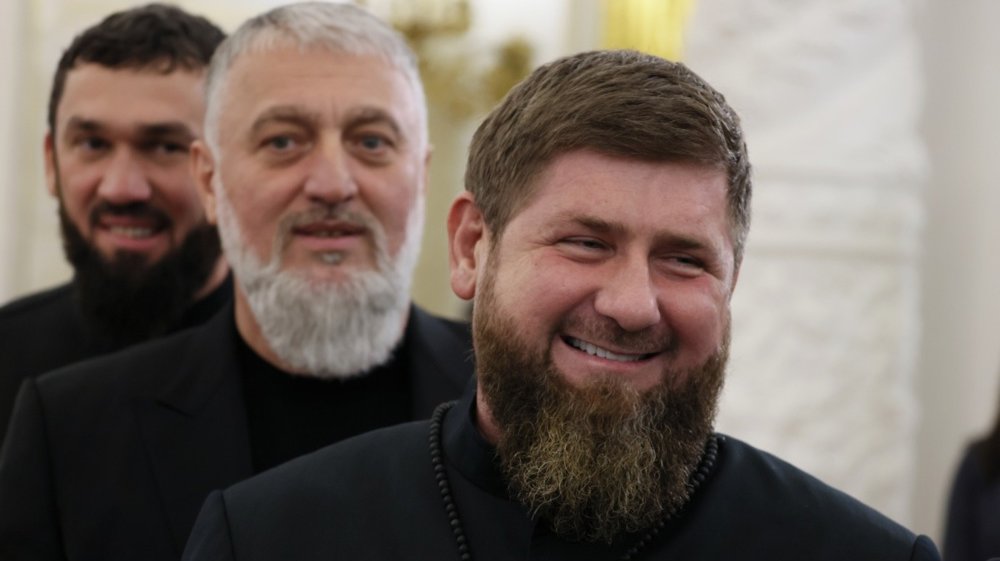The Chechen political landscape remains uncertain as Ramzan Kadyrov’s health deteriorates, with several potential successors vying for the top job.
While hints have been dropped that Apti Alaudinov, the commander of the Chechen volunteer unit Akhmat, may be the top candidate, there are other potential heirs to the Chechen throne, including Kadyrov’s sons and his closest allies.
The sons
Speculations about potential successors for Chechen strongman Ramzan Kadyrov began last March, when Russian President Vladimir Putin unexpectedly met with Kadyrov’s eldest son Akhmat in the Kremlin.
This highly unusual meeting took place as rumours swirled about Kadyrov’s deteriorating health, exacerbated by his absence from the president’s federal address in February.
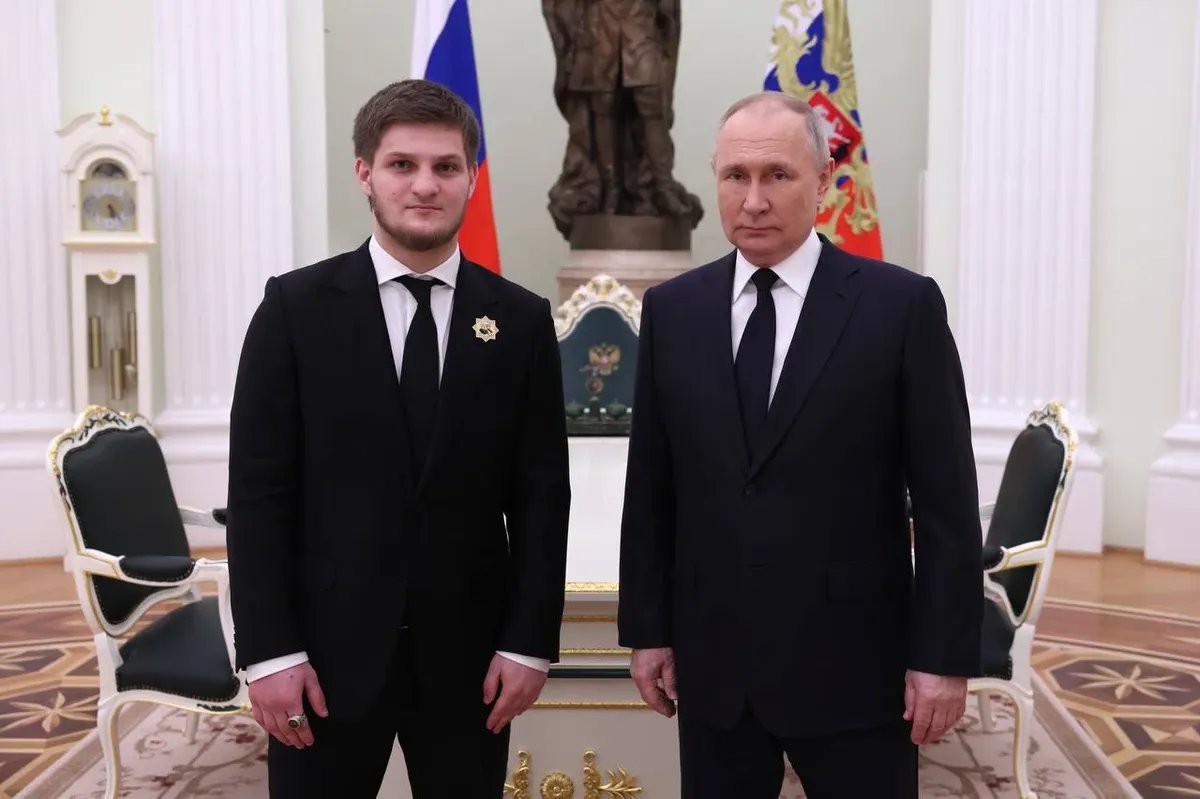
Akhmat Kadyrov meeting with Putin at the Kremlin. Photo: Ramzan Kadyrov’s Telegram channel
However, Akhmat’s moment in the limelight ended as suddenly as it had begun, and public attention soon turned to his younger brother Adam, Kadyrov’s third son, who catapulted to fame in September after beating up Nikita Zhuravel, a prisoner accused of burning the Quran.
Zhuravel’s case killed two birds with one stone: it distracted the Russian public from rumours of Kadyrov’s illness and boosted Adam’s public image, which had taken a hit when famous Chechen blogger Tumso Abdurakhmanov accused him of drug addiction last spring. Abdurakhmanov also suggested that Adam was homosexual, although neither claim was backed by facts.
Chechen officials used the Zhuravel beating to distract from these allegations and present Adam Kadyrov as a “defender of Islam”. They did not, however, intend to show him off as a potential successor.
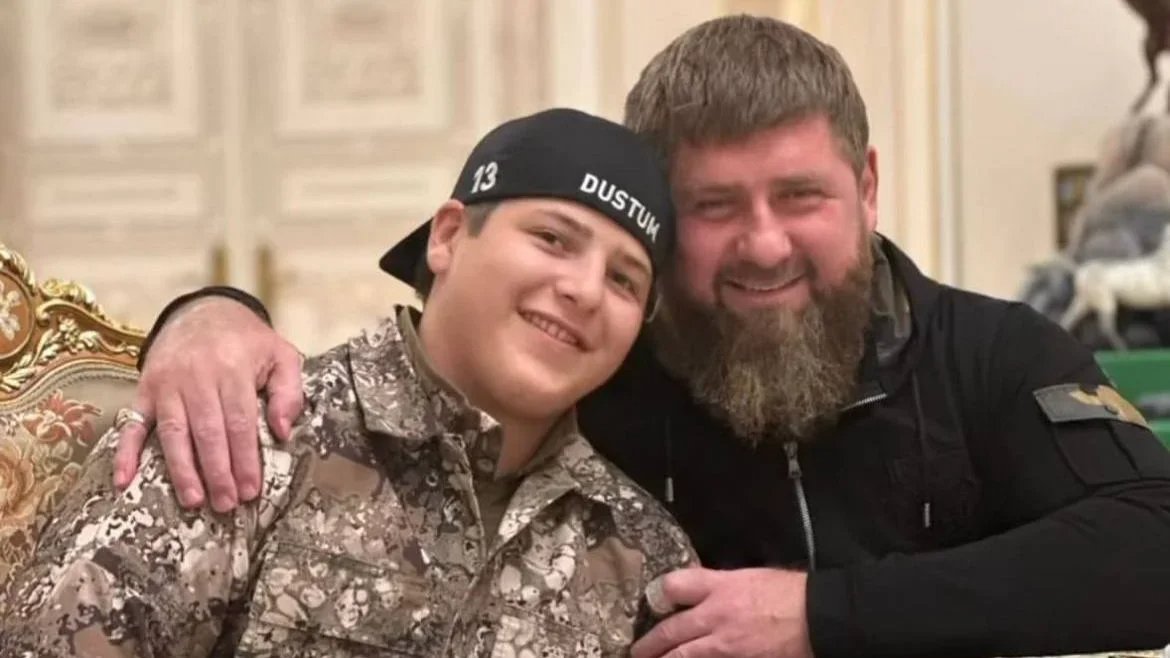
Adam and Ramzan Kadyrov. Photo: Kadyrov’s Telegram channel
For no matter how closely the Chechen power structure may resemble a dictatorship, its leader is not omnipotent; regardless of Kadyrov’s actions, the next head of Chechnya will ultimately be appointed by Putin.
Kadyrov himself didn’t inherit power. It is more accurate to say he won it, in a Hunger Games-like scenario engineered by the Kremlin after his father, Akhmad Kadyrov, was assassinated in 2004.
So the increased press coverage of Kadyrov’s sons last year is more likely an attempt to protect them, not a sign of their imminent succession to the throne.
Akhmat was introduced to Putin as the future head of the Kadyrov clan, not of Chechnya.
The true purpose of this meeting was to show off the resource that the Kadyrovs, and no other Chechen clan, boast — a close personal relationship with Putin. The meeting made it clear that the Russian president would continue to guarantee the safety of the Kadyrov family, whether or not it is officially in power.
But if power in Chechnya really were hereditary and the Kadyrov cult were to live on, it would be worth mentioning another potential successor: Khamzat Kadyrov, the 27-year-old son of Ramzan’s late brother Zelimkhan.
Khamzat tried to establish himself as the top dog in Chechnya while Kadyrov was absent due to his illness in September, collecting money from several high-ranking Kadyrovites in an attempt to show his power, while nobody dared put him in his place.
That said, Khamzat’s chances of succession to the throne are extremely low. Notoriously reckless, he has regularly caused scandals within the family, and is unlikely to win his uncle’s approval.
The daughters
Ever since Ramzan Kadyrov’s health troubles began, forcing frequent spells of absence from the public eye, Kadyrov has always reappeared thronged by family members. These strategically-placed family reunions bring together the women of the family — Kadyrov’s sisters and married daughters — from numerous households.
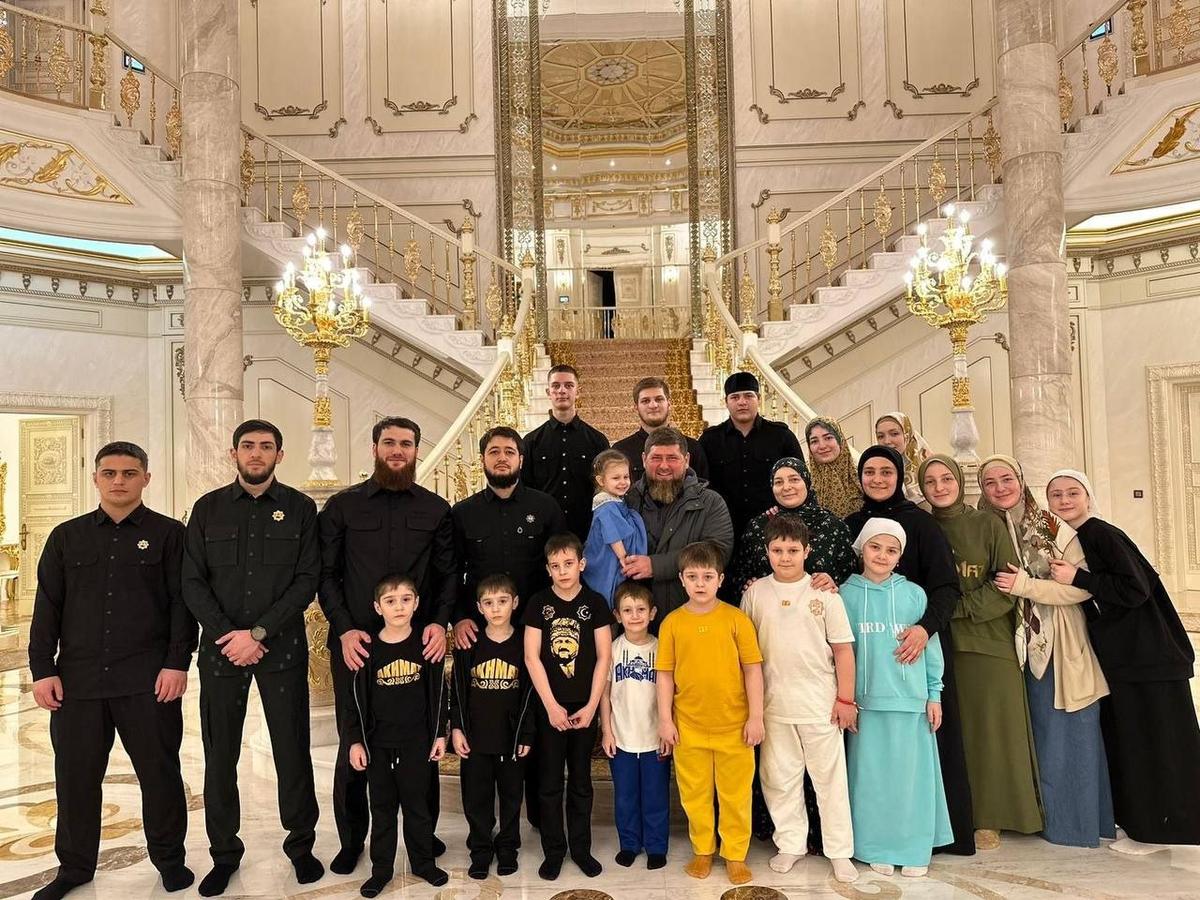
A Kadyrov family picture. Photo: Kadyrov_95 / Telegram
According to Chechen tradition, Kadyrov’s sisters and daughters are formally part of their husbands’ families, yet their high position in Chechen society comes from Ramzan, not their husbands. For this reason, the Kadyrov women compete fiercely for Ramzan’s attention to defend both their own interests and those of their children.
Unlike the Kadyrov sons, who appear more interested in clothing brands, parties and computer games than leadership, Kadyrov’s daughters exhibit both character and will.
In recent years, as his daughters have grown older, Kadyrov has made a noticeable attempt to change the role of women in Chechen society. When one of his daughters, Aishat Kadyrova, was named deputy chair of the Chechen government in October, parliament speaker Magomed Daudov lauded her as a “talented and creative leader”.
Yet revolutionary change in gender relations is still a long way off in Chechnya, and the traditional patriarchy is unlikely to welcome a female head of the republic any time soon.
The right-hand men
Beyond his family, two members of the Kadyrov entourage stand out to commentators as possible successors: Magomed Daudov, the speaker of the Chechen parliament, and Adam Delimkhanov, the deputy for Chechnya in Russia’s lower house of parliament, the State Duma.
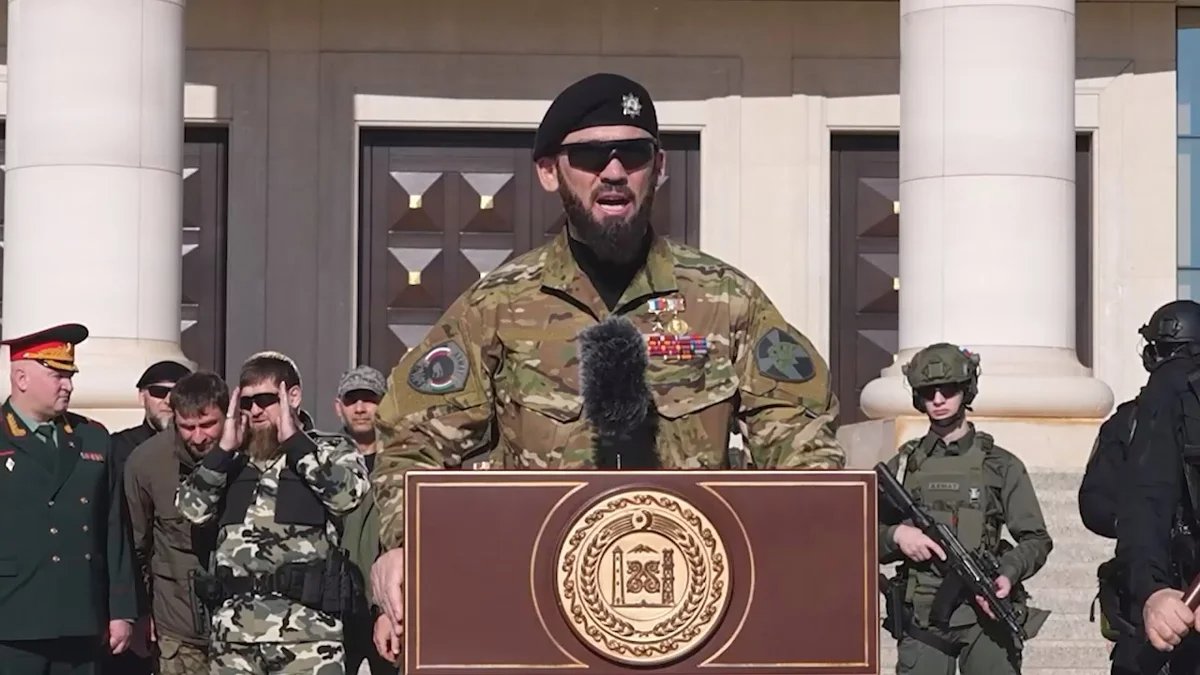
Magomed Daudov. Photo: Ramzan Kadyrov / VK
Both have been close associates of Kadyrov’s from the early days of his rule. Officially, their spheres of influence do not overlap, but they have clashed frequently, and they do not wield equal influence; Delimkhanov appears to have substantially more power than Daudov.
Daudov operates exclusively within the republic, where he is known as the regime’s attack dog and has proven himself both cruel and efficient. Kadyrov tasks him with solving all unforeseen emergencies, from combating Covid to securing a supply of volunteers to fight in Ukraine.
As secretary of the Chechen branch of United Russia, the country’s ruling party, he knows and communicates with the Kremlin leadership, but he does not appear to maintain close relationships with any federal officials or security agencies. And despite his many years of faithful service, Daudov has never managed to join the inner circle or become a financially independent centre of power in his own right.
Delimkhanov, in this respect, is different. As a de facto leader outside Chechnya, he both supports and monitors the Chechen diaspora in Russia and has huge influence in Central Asia and the Caucasus, primarily in Kazakhstan and Kyrgyzstan — where there has been a sizeable diaspora ever since Stalin’s mass deportation of Chechens in February 1944 — but also in Uzbekistan and Georgia.
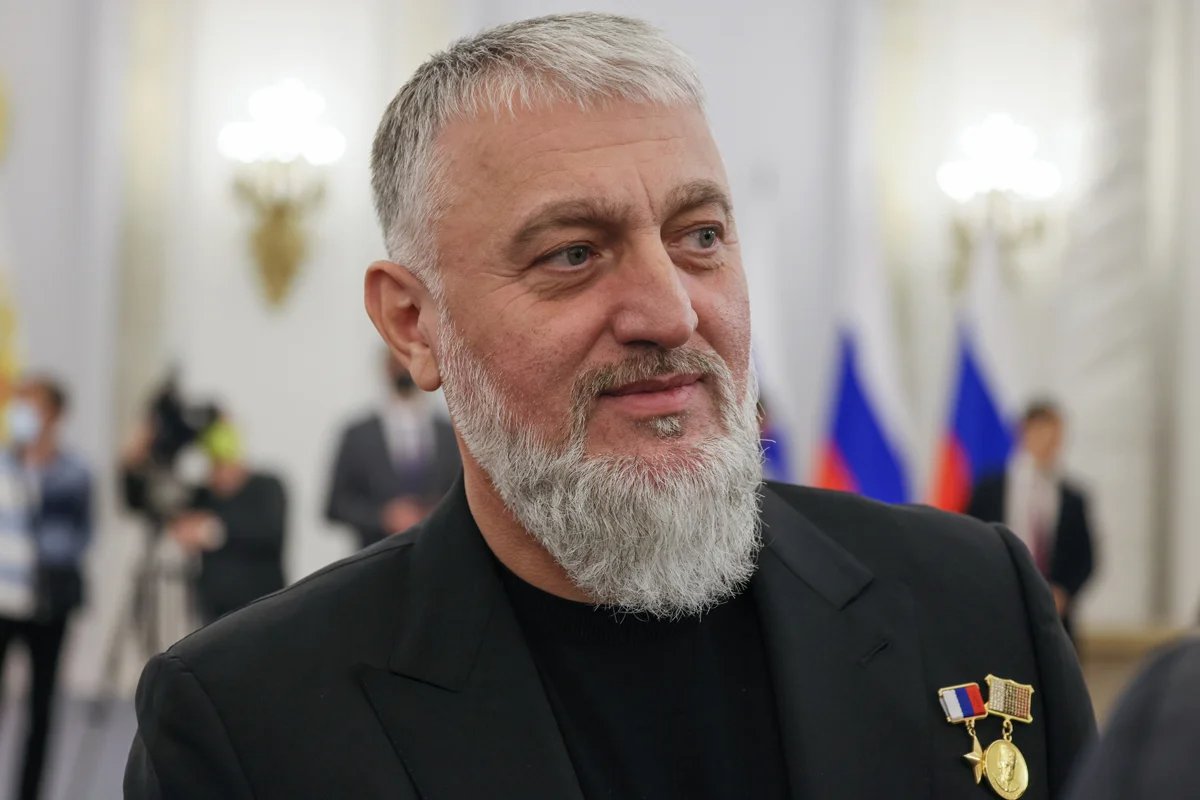
Adam Delimkhanov. Photo: EPA-EFE/MIKHAIL METZEL/SPUTNIK/KREMLIN POOL
Delimkhakov is well known — mostly for his illicit activity — in the UAE, Turkey and Jordan, and his underlings work actively in Europe and the US, aiming to keep opposition-minded Chechens in check.
With their close relatives, the Geremeyevs, the Delimkhanovs are probably the second-most powerful clan in Chechnya, in terms of both power and money. In this sense, the Delimkhanovs resemble the once-famous Yamadaev clan, who used to be known in the Kremlin as “Russia’s honoured bandits” but are powerless today.
However, there’s a dark stain on Delimkhanov’s record, too, which could put an end to any career prospects: his extensive ties with the criminal world, in Russia and abroad.
Not for nothing was Delimkhanov the first of the Kadyrov circle to be hit by American sanctions. In Delimkhanov’s case, the sanctions were approved not as part of the Magnitsky Act — reserved for human rights violators — but rather through the US Treasury blacklist of international criminals.
Delimkhanov can only stay at the top while Kadyrov is still alive, and he appears to know that himself, repeatedly and forcefully urging Kadyrov to take his health problems seriously. Were Kadyrov to die, Delimkhanov wouldn’t just risk losing his influence; his own life would be on the line, too.
The Kadyrov personality cult and its monopoly on violence are already destabilising Chechnya. The Kremlin can only solve that problem when power changes hands.
Join us in rebuilding Novaya Gazeta Europe
The Russian government has banned independent media. We were forced to leave our country in order to keep doing our job, telling our readers about what is going on Russia, Ukraine and Europe.
We will continue fighting against warfare and dictatorship. We believe that freedom of speech is the most efficient antidote against tyranny. Support us financially to help us fight for peace and freedom.
By clicking the Support button, you agree to the processing of your personal data.
To cancel a regular donation, please write to [email protected]
